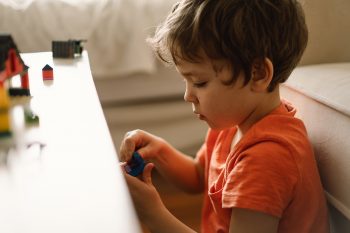Home /
Trauma and The Power of Attunement

By Nicole Copple, LCSW Clinician
Take a moment to think back to a time where you were feeling overwhelmed with emotion, this could be excitement, sadness, frustration … Now think about how those around you reacted.
Were they listening and making eye contact?
Did they display the same emotion as you? Or did they dismiss what you were feeling?
Maybe they tried to jump into problem solving and advice giving to make you feel better?
How people respond to us and our emotions is vital to how we experience ourselves and our relationships. Feeling seen, heard and understood: this is the power of attunement.
From birth, our brains are wired for attunement. Attunement begins with infants, for example, when a parent smiles when a baby smiles, or when they say “whoops” when the toddler drops something. This communicates to the child that the parent understands and shares in their feeling with them. Go back to example earlier, if someone is nodding their head and making eye contact when you’re talking, you can sense that they understand and hear you. However, when someone is looking at their watch or glancing around the room, you don’t feel as connected or understood by that person. Attunement is responding to someone in a way that shows we see how they are feeling, understand, and are willing to be with them in that state.
Attunement is important for children to receive because it impacts they view themselves and their relationships. However, sometimes attunement is missing, even for young children. Trauma can often impact the way a child’s brain functions and responds to stress. The good news is, the brain is also wired to heal. By providing attunement to children, we can help them to “rewire” their brains by feeling seen, heard, and cared for. So how do we attune to children? Below are a few examples of simple ways to attune to kids of different ages.
How to Attune to Your Child Based on Age
For babies and young children, attunement is shown by responding to a baby’s cry and providing basic needs. This happens almost constantly throughout the day. By picking up a baby and holding them, providing food, or soothing – a parent is showing that baby that they are acknowledging their emotion and providing them with their need.
As a child grows into a toddler, attunement can include labeling and validating emotions. If a child knocks over their tower and cries a parent could say “Oh that’s so frustrating” while also displaying some disappointment or frustration. This provides the child with validation of their emotion and verbalization that they can eventually utilize themselves. “Mirroring” or matching a child’s movements and play is also a form of attunement, this shows that you are in the experience with them and again, validates their experience.
Early & middle childhood is a time that children are beginning to strengthen their relationships with others outside of the family. Providing attunement at home is a great model for helping children see what healthy communication and relationships look like. Showing genuine interesting and listening when children talk about their day is a great example. When children are having difficult emotions, being able to sit with them in their emotion without trying to fix it also helps them to have their own tolerance and acceptance of emotions.
For pre-teens & teens, attunement can look like listening without judgement. Often we want to problem solve or teach our children life lessons, which is appropriate at times, but listening and validating their feelings can be powerful. Showing our children that we are there to listen and understand can help them to feel safe in sharing with us. Continuing to name the emotion can provide further skills for them to be able to do so themselves.
It may seem overwhelming to do this all day with your child, so let me leave you with some encouragement. Through research, experts have found that even the best parents are attuned to their children 30% of the time. That means you don’t have to be a perfect parent! Even 30% can make an impact. I hope you can take a few of these tools to implement with the children in your life, and especially for those with trauma, I hope you can see the power of attunement.
References
Puderbaugh M, Emmady PD. Neuroplasticity. [Updated 2022 May 8]. In: StatPearls [Internet]. Treasure Island (FL): StatPearls Publishing; 2022 Jan-. Available from: https://www.ncbi.nlm.nih.gov/books/NBK557811/
Tronick, E., & Gold, C. (2020). Power of discord: Why the ups and downs of relationships are the secret to building… intimacy, resilience, and Trust. SCRIBE PUBLICATIONS.
